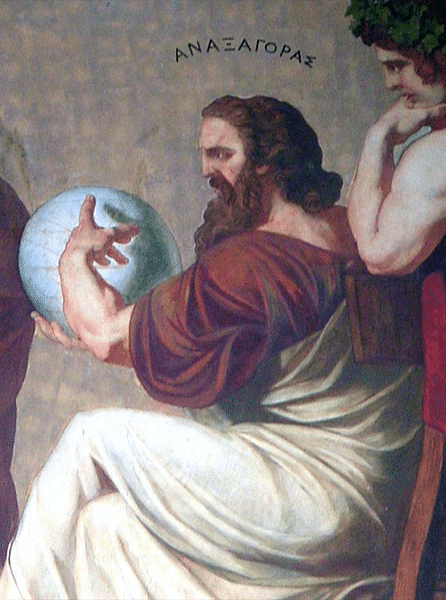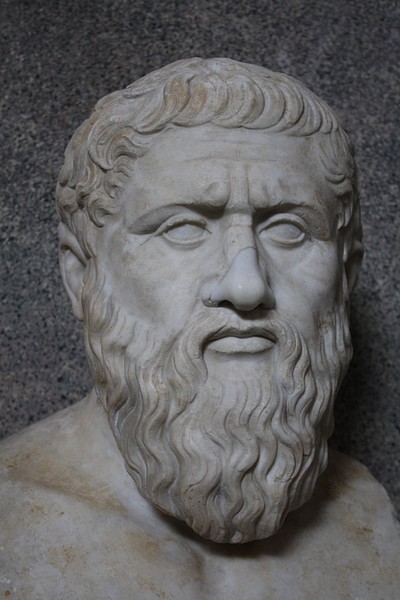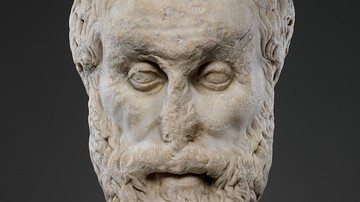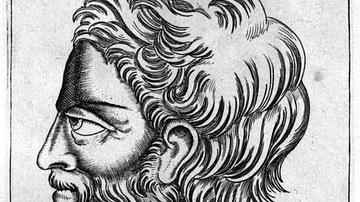
Anaxagoras (l. c. 500-c. 428 BCE) was a Pre-Socratic Greek philosopher who claimed the First Cause of existence was Mind (nous) and all things were constituted of indestructible “seeds” (or “stuff”), originally a single mass, separated and arranged by Mind. Everything, therefore, was a part of everything put into motion by Mind.
He was criticized by Plato (428/427-348/347 BCE) and Aristotle (384 to 322 BCE) for failing to define this Mind or to make much use of it in his philosophy but Anaxagoras was greatly admired in his time. Pericles of Athens (495 to 429 BCE) was his student and close friend, and he was also acquainted with, and influenced, Euripides (l. c. 484-407 BCE), Aristophanes (l. c. 460 - c. 380 BCE), and Democritus (l. c. 460 - c. 370 BCE), among other luminaries of the time. He was also the teacher of Archelaus (l. 5th century BCE) who is thought to have been the teacher of Socrates (470/469-399 BCE) and is therefore regarded as the last Pre-Socratic philosopher.
Anaxagoras was a student of Anaximenes (l. c. 546 BCE) who claimed the First Cause was air, but Anaxagoras’ primary focus seems to have been a response to the claims of Parmenides (l. c. 485 BCE) and Zeno of Elea (l. c. 465 BCE) who rejected the concept of change, claiming that all existence was of one single indestructible and unmovable substance. Anaxagoras may also have been responding to the teachings of Empedocles (l. c. 484-424 BCE) though this claim is challenged.
His Mind and “seed” theory is understood as an attempt, like that of Empedocles, to reconcile apparent change with the changeless nature of existence. He is thought to have (like Empedocles) influenced Democritus and Leucippus (l. c. 5th century BCE) in their development of the atomic universe as well as influenced the philosophies of Plato and Aristotle, despite their later criticisms. He is the first Pre-Socratic philosopher to have taught in Athens, helping to establish the city as a seat of learning, and is recognized today as one of the more influential early Greek philosophers.
Early Life & Education
As with many of the Pre-Socratic philosophers (those who lived and wrote before Socrates' time), most of what is known of Anaxagoras’ life comes from the often-unreliable work of the historian Diogenes Laertius (l. c. 180-240 CE). Laertius was working from sources no longer extant but failed to cite them and frequently presents hearsay or legend as fact. Still, he is cautiously cited by scholars for those passages which seem historically accurate.
According to Laertius, Anaxagoras was born to a wealthy family of Clazomenae, one of the Ionian Greek settlements of the west coast of Asia Minor (modern-day Turkey) ruled at the time by the Achaemenid Persian Empire. His father’s name was either Hegesibulus or Eubulus. He seems to have been drawn to philosophical speculation at an early age and had little regard for material gain. Laertius writes:
He was eminent for wealth and noble birth, and furthermore, for magnanimity, in that he gave up his patrimony to his relations. For, when they accused him of neglecting it, he replied, “Why then do you not look after it?” …When someone inquired, “Have you no concern in your native land?” He replied, “I am greatly concerned with my fatherland”, and pointed to the sky. (III.6)
Similar stories by other writers support the claim that Anaxagoras abandoned his wealth to concentrate on philosophy, though the details differ. In one account, he returned home from a trip to find his house and property in ruin and left it, saying, “If this had not been destroyed, I would have been” as he found attachment to material possessions detrimental to the pursuit of wisdom.
Ionia was the birthplace of Greek philosophy as it was the home of Thales of Miletus (l. c. 585 BCE), Anaximander (l. c. 610 - c. 546 BCE), and Anaximenes as well of the later philosophers Xenophanes of Colophon (l. c. 570 - c. 478 BCE) and Heraclitus of Ephesus (l. c. 500 BCE). Pythagoras (l. c. 571 - c. 497 BCE) came from the island of Samos, off the coast. The region was therefore already associated with philosophy by the time Anaxagoras was born and he became a student of Anaximenes.
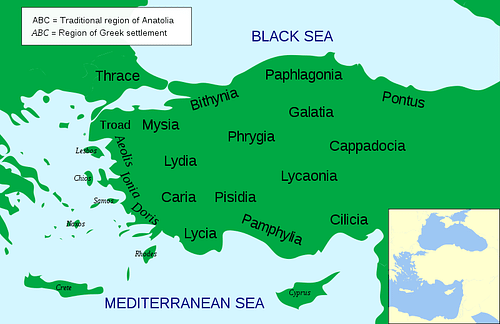
The early Greek philosophers were interested in determining the First Cause of existence which served as the underlying form in how things worked. Thales claimed this was water while Anaximander believed it was an eternal creative force he called the apeiron. Anaximenes claimed it had to be air because, as air became rarefied or condensed, it changed form, becoming now a solid (ice) and now fire or other elements depending on density.
Other philosophers made their own claims, however, including Pythagoras who understood the First Cause as Number and Xenophanes who maintained that all emanated from a single God, rejecting the polytheistic model of his day. Heraclitus argued that everything came from and operated through fire, strife, and that life was defined by constant clashes of opposites. Parmenides, however, suggested a completely different model which would inform the systems of those who came after him, including Anaxagoras.
Parmenides’ Challenge
Parmenides taught the concept of Monism, that all of reality consists of a single substance which was never created and can never be destroyed but has always existed exactly as it does in the present. Since this substance is unchangeable, any change observed in life must be an illusion because something cannot come from nothing, nor can something come from what it is not like. When a person observes what they define as “change”, they are allowing their sense perceptions to convince them of what cannot possibly be and are interpreting “appearance” as “reality” because the essence of life does not admit of change. Scholar John Mansley Robinson explains:
In setting out to give a coherent account of the world about them, the Ionians had proceeded on certain assumptions. They had assumed, first and foremost, the reliability of the senses; and the senses revealed to them a world which, though it was in some respects one, was made up of opposites which, by interacting with one another, produced change. Parmenides had called all this into question. It is impossible, he argued, to maintain that the world is in any real sense one and at the same time many. If it is one at all, the very possibility of a many is ruled out, and in such a world motion and change simply cannot take place. The arguments by which these conclusions were reached seemed to Parmenides’ contemporaries and immediate successors to be compelling, and it was obviously impossible to proceed with the program of the Ionians until Parmenides was answered. To answer him, therefore, became the immediate task of all those who were committed to carrying out this program. (151)
The task was further complicated by Parmenides’ student, Zeno of Elea, who formulated 40 logical paradoxes proving motion is impossible and change an illusion. His most famous, the Race Course, makes clear that between Point A and Z on a track, one must first run halfway but, between Point A and the halfway mark is another halfway mark and between Point A and that halfway mark is still another. One can never reach Point Z, then, because to do so, one must reach halfway, and there is always another halfway mark.
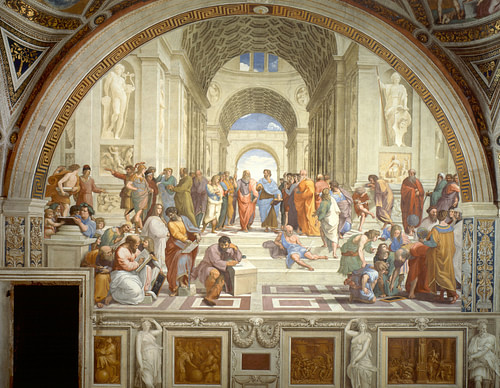
Empedocles was the first to synthesize all the earlier philosophical systems in answer, claiming that the root causes (elements) were changeless but were brought together through the principle of Love (attraction) and separated by Strife (opposition) so that one could understand the essence of the world as changeless while also recognizing the reality of change.
Anaxagoras seems to have been responding to Empedocles’ claims in answer to Parmenides through his system. It is unclear when he developed his philosophy or when he arrived in Athens and began teaching it. Some sources suggest he served in the Persian army during Xerxes’ invasion of Greece in 480 BCE (as many Ionian conscripts did) and stayed afterwards while others indicate he came on his own later, possibly as late as 456 BCE. He may have already come to his conclusions prior to his arrival and may have also already written the one book he is known for, but this is unclear.
Anaxagoras’ Philosophy
His philosophical system claims that all things in the universe share in the same substance that Parmenides claims is immobile, but that change is possible within that model through the operation of “seeds” that are the root causes of transformation. Nothing can come from nothing, Anaxagoras agreed, and nothing can come from what it is not like. All things, then, are constituted from the same root material (seeds) and are differentiated by how much of a certain “seed” is present. Hair, for example, has more “hair seed” than skin, making hair, hair and skin, skin. The Mind separated these seeds from the unified mass at the beginning of time but what part Mind then had in their operation afterwards is undefined.
What is clear to Anaxagoras is that the model of reality people believed in was flawed in that it presented a world in which people and other things came into existence from nothing and passed away into this same nothing. He writes:
The Greeks are accustomed to speak of “coming into being” and “passing away” – but mistakenly; for nothing comes to be or passes away. There is only a mingling and separation of what is. It would be more correct, therefore, to call coming into being “mingling” and passing away “separation”. (DK 59B.17/Robinson, 175)
Since nothing can come from nothing, all that is must come from something and this “something” was originally a unified mass which was separated and organized by Mind. Therefore, Anaxagoras claims, “In everything, there is a portion of everything” (DK59B.11/Robinson, 177). All things share in the same essential substance. What differentiates one thing from another is the quantity of a certain substance. A rock assumes the shape defined as a “rock” because it has more of the rock-substance in it than a sheep. If the sheep had more rock-substance (seed), it would be a rock.
The essence of what-is exists in the food one eats which, transformed, sustains an individual’s life, becoming flesh, hair, and organs, as Anaxagoras notes:
We take in nourishment that is simple and of one kind, such as bread and water, and by this hair, veins, arteries, flesh, sinews, bones, and the other parts of the body are nourished. This being so, we must agree that all existing things are in the nourishment that is taken in, and that by these everything is increased. There exist in the nourishment “portions” of which some are productive of blood, others of sinews, others of bones, and so on – these “portions” being perceptible to reason alone. (DK 59A.46/Robinson, 177)
It is unreasonable to claim that a human being can generate muscle by ingesting that which is not muscle since like must come from like, so there must be something in food that shares a sameness with muscle, and this is the “seed” or “stuff” that is the essence of what-is. The only aspect of existence which is not “mingled” with anything else is the Mind that originally organized what-is into perceptible reality:
Other things have a share of everything, but mind is infinite and self-ruled and not mixed with anything, but is alone by itself. For if it were not by itself, but were mixed with anything else, it would, by virtue of being mixed with this, have a share of all things; for there is a portion of everything in everything, as I have said before. And the things that were mixed in it would hinder it, so that it could control nothing as it does now, being alone by itself. For it is the finest of all things and the greatest power; and over everything that has soul, large or small, mind rules.
And mind controlled the whole rotation, so that it rotated in the beginning. And at first it began to rotate from a small beginning, but now it rotates over a large area, and it will rotate over a still larger area. And mind knows all the things that are mingled and separated out and distinguished. And what sort of things were to be, and what sort of things were (which now no longer are), and what now is, and what sort of things will be – all these mind arranged, and the rotation in which now rotate the stars and the sun and the moon and the air and the ether that are being separated off. (DK 59B.12/Robinson, 181)
Once Mind has separated original essence and set all in motion, it seems to then only increase the area of the rotation of separation. Reality continues to function as it does through the mingling of the “seeds” of eternal essence, but Mind has nothing to do with that. Having organized a functional universe, Mind does not participate in that universe but only periodically expands its area.
Plato’s Reaction to Anaxagoras
Anaxagoras’ concept of the Mind, according to Plato, greatly interested Socrates until he discovered that it was left undeveloped. In Plato’s Phaedo, Socrates relates how he heard someone (probably Archelaus) read from Anaxagoras’ book and was intrigued by the suggestion of a Universal Mind that “will order and arrange each thing in the best possible way” (96c). When Socrates finally reads the book himself, however, he is disappointed:
All my splendid hopes were dashed to the ground, my friend, for as I went on reading, I found that the writer made no use of Mind at all, and that he assigned no causes for the order of things. His causes were air, and ether, and water, and many other strange things. (98c)
Plato goes on to criticize Anaxagoras, noting how he attributes cause to natural elements that have no ability to give cause while leaving Mind completely out of the discussion, even though Mind would have been the wiser choice in developing a cause. Aristotle, though he admired Anaxagoras, and most likely owes his concept of the Prime Mover (that which began all things but does not participate) to him, has a similar criticism.
Conclusion
Anaxagoras, however, seems to believe his Mind concept needs no further development because its role is self-evident: it set perceivable reality in motion from a state of unity and therefore answers Parmenides and Zeno. The universe is of a single substance but change and motion are possible through the “mingling” of substances which, when their present form breaks apart, separate to take another form. Mind was the architect of this design and, once completed, did not need to participate further. In answer to Zeno’s Race Course, then, one would be able to move from Point A to Point Z in a Monist universe through the mingling and separation of essential essence which allows for what people define as “motion” and “change”.
Anaxagoras continued to teach at Athens until he was charged with impiety in c. 450 BCE for denying the sun and moon were deities, claiming instead they were rocks. The charges may have stemmed from his close association with Pericles whose political enemies decided to attack the teacher to harm his student. Pericles spoke in Anaxagoras’ defense, and he was allowed to pay a fine, rather than face a trial and possible execution, and he retired to Lampasacus in Troad (modern-day Turkey) where he lived out the rest of his life as a highly respected philosopher and teacher.
When the citizens of Lampasacus asked him what memorial he would prefer to be remembered by, he requested that a holiday should be granted to the students of the city in the month of his death and, according to Laertius, this celebration was observed up through his time. The people also raised a monument to him in honor of his commitment to seeking the truth of the nature of existence. Anaxagoras’ work, as noted, continued to exert considerable influence over later philosophers, even those who criticized him.
(Author's Note: The DK in citation above references the Diels-Kranz system of numbering Pre-Socratic fragments included in most books on the subject)

